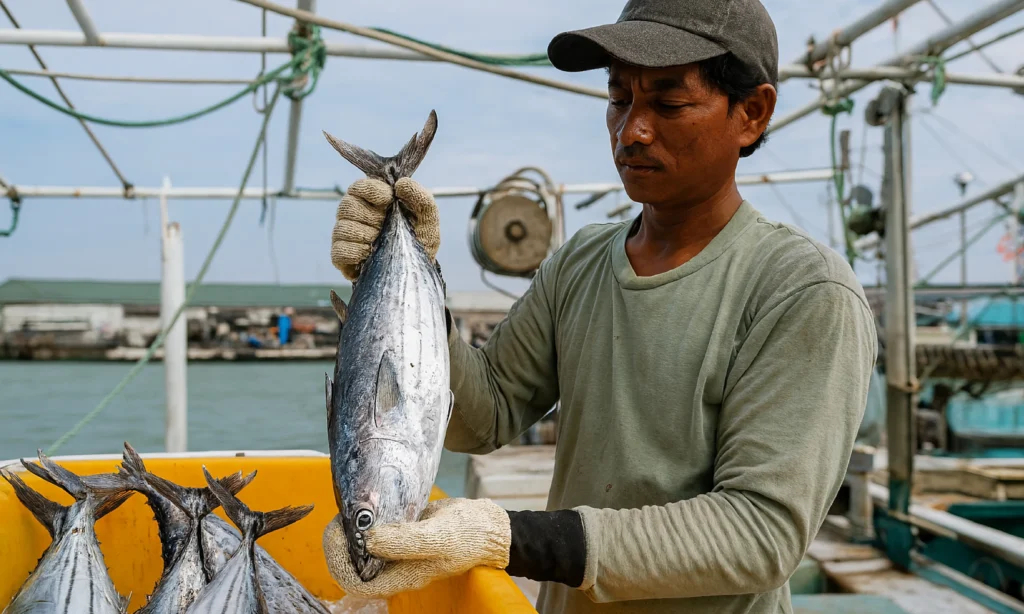Against the backdrop of the long coastline and the geography of the country with numerous islands, the Greek fishing industry is an essential sector of employment and local economies in 2025. This paper will look at employment opportunities in labor jobs, the necessary skills, employment opportunities, and current challenges affecting the Greek fisheries in the modern world.
Greek Fishing Labor Market overview
Greece remains one of the biggest fishing countries in the Mediterranean. The industry is a major source of employment in most coastal and island regions with more than 15,000 professional fishing vessels and about 23,400 individuals working in the fishery industry.
Fishing Jobs Types
Most of the employments in the Greek fishing industry are practical and labor-intensive:
- Deckhands and Crew Members -They are directly engaged in catching, sorting and storing fish.
- Fishing Vessel Operators – They ensure navigation, maintenance and safety of the vessels.
- Fish Processing Workers- These workers are involved in cleaning, filleting and packing of fish to be distributed.
- Aquaculture Support- Fish farm employment, fish feeding, fish monitoring and fish stock maintenance.
- Maintenance and Harbor Support – The repair of nets, boat repair and logistics.
Current Openings in 2025
There is constant demand of fishing labor, particularly in:
- The islands of Aegean and Ionian islands
- Traditional fishing fleets in coastal regions
- Increase in aquaculture plants
Jobs include seasonal work to permanent jobs. Peak season during the spring and summer also opens more positions especially of deckhands, fish processors, and aquaculture assistants.
Important Information to Job Seekers:
- There are full time and part time jobs.
- Physically fit candidates who are team players, and learners are preferred.
- On-the-job training may be available in some jobs, but experience is good.
- The use of foreign labor is becoming more significant to meet the shortages in the workforce.
How to get Fishing Jobs
- Large internet job boards focusing on maritime, agricultural and seasonal employment
- Recruitment agencies in local towns in the islands and the coasts
- Fishing cooperatives and vessel owners taking up direct hiring
- Fishery job boards and local communities at the national and regional level
Pro Tip: Signing up with job sites early will give more access to notifications of new jobs.
The most important Skills and Requirements
Although entry-level fishing labor jobs may not require formal education, the employers are looking forward to:
- Physical strength and stamina: The job is physically strenuous and in most cases during bad weather.
- Swimming skills: Swimming skills are very important in terms of safety.
- Teamwork: Fishing teams are required to work as a team within close proximity.
- Flexibility: The functions may vary with the type of catches, and weather.
- Safety dedication: It is vital to wear safety equipment and follow the procedures.
Other certifications including a basic seamanship certificate or experience in the use of vessel equipment can enhance the chances of hiring.
Wages and Conditions of work
Typical Earnings
Salaries depend on position, experience and location. The wages of most entry-level fishing jobs are slightly above the minimum wage with experienced crew and vessel operators earning more. Additional remuneration is in the form of catch-share and seasonal bonuses on productive periods.
| Role | Monthly Salary (EUR) |
| Entry-level deckhand | 800 – 1,200 |
| Experienced crew/technician | 1,200 – 2,000+ |
| Fish processor | 900 – 1,300 |
| Aquaculture worker | 900 – 1,500 |
Work Environment
- Irrational and long hours, usually at night or early in the morning
- Being exposed to bad weather, sun, and sea conditions
- Hard labor: pulling nets, cleaning fish, gearing up equipments
- Safety risks such as slips, accidents and fatigue are high
The Greek officials and industry bodies encourage the usage of protective equipment and frequent safety training.
Challenges Facing Fishing Labor in Greece
Although job opportunities remain open, there are a number of challenges that shroud the future of the sector:
1. Aging Workforce and Labor Shortages
- Aging workforce is an issue that is becoming increasingly prevalent in the United States.
- The average age and education of the sector workforce is lower.
- Young Greeks are unwilling to join the fishing business as they perceive it as unstable, with poor working conditions, and low pay.
2. Greater Dependency on Foreign Labour
- The migrant workers have become a necessity and they are willing to fill the positions that the locals are not willing to fill.
- There are bilateral agreements to hire foreign fishermen, although the figures are less than the industry requires, and the government has recently tried to simplify work permits and hire foreign fishermen.
3. Social Economic and Structural Problems
- The majority of the Greek fishing boats are small-scale (94 percent less than 12 meters) which restricts the earning potential and employment stability.
- Fleet and technology modernization is cut off by the lack of access to credit and investment.
- Most employees claim that they are not satisfied with their job, they have a low career development and do not receive much training.
4. Workplace Safety and Health Risk
- Unsafe conditions: Small, unstable boats, old equipment and absence of proper safety equipment.
- Typical problems are musculoskeletal trauma, sunburn, exhaustion, and nutritional/health issues enhanced by solitude living conditions.
- There are still demands to increase health services to fisherfolk and implement safety measures more effectively.
5. Market and Environment Pressure
- Fish stocks and the future of the sector are under threat because of overfishing, pollution and climate change.
- The competition of industrial trawlers and imported seafood is increasing and affects the local fishermen in terms of employment and income.
Opportunities and Prospects of 2025
Nevertheless, in spite of these difficulties, there are still good opportunities in the Greek fisheries sector to those job seekers who are passionate about working in the maritime sector. Key trends for candidates:
- The development of aquaculture is generating additional and diversified employment opportunities, and there exists the possibility of career development in fish farming and processing.
- Employability can be enhanced through skill development, certifications and readiness to work in far flung areas.
- Current sector reforms are designed to appeal to young people, modernize fleets and enhance labor standards.
Tips for Job Seekers
- Emphasize on pertinent competencies: Ability to swim, maritime, or machine operation.
- Network in your area: A lot of employment opportunities are acquired by word of mouth, particularly in small communities along the coast.
- Make sure to stress flexibility and dependability during job application and/or interviews.
- Look at seasonal or part time work as a step to permanent work.
Conclusion
Greek fishing industry provides demanding yet essential work to individuals who want to work outdoors and perform manual work in 2025. Though the industry contends with aging workforce, safety, and sustainability issues, opportunities still exist especially in the form of flexible, highly driven job seekers who are willing to work in both the traditional fisheries and the contemporary aquaculture environment. The training, safe working conditions, and recruitment of the new talent policies will play a crucial role in maintaining the Greek fisheries in the future.



